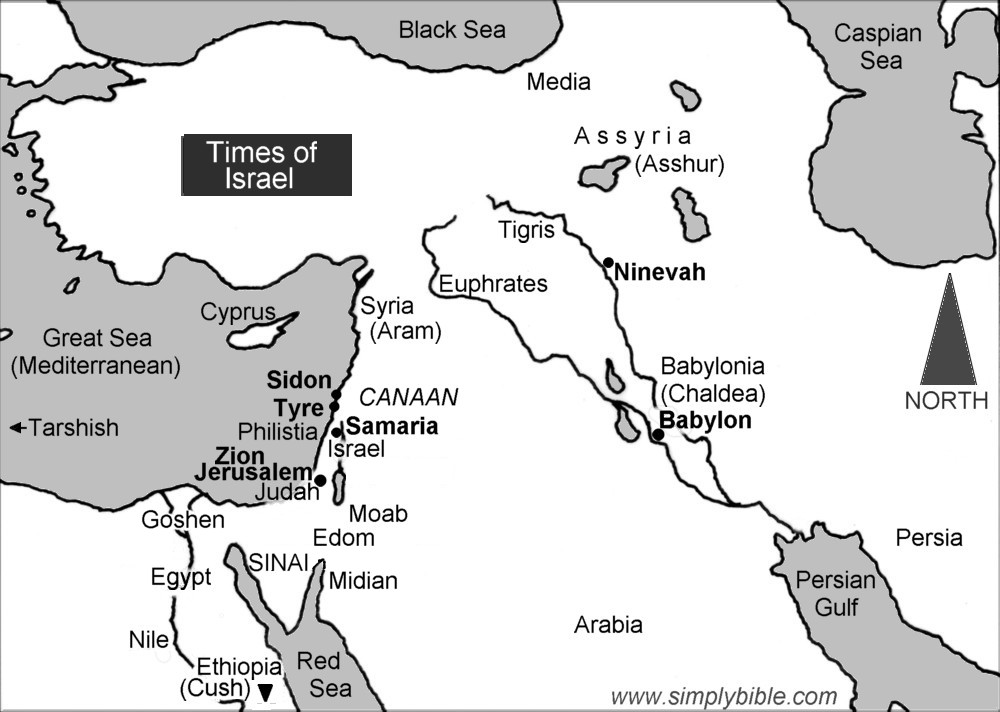
Ezekiel Chapters 24 and 25
—Outline and Notes
1 Context Overview
The 24th chapter of Ezekiel is about the beginning of the siege of Jerusalem by Nebuchadnezzar king of the Chaldeans.
Zedekiah was reigning in Jerusalem at the time. He was in the ninth year of his reign. He had been stupid enough to rebel against Nebuchadnezzar.
Worse still he, like most people in Jerusalem, did evil and did not listen to God. That's why Nebuchadnezzar was able to destroy Jerusalem (see Jeremiah 52).
The Chaldean king's palace was in Babylon nearly 1,500km (900 miles) from Jerusalem. But his armies marched across the world conquering.
Nebuchadnezzar had been troubling Jerusalem and Judah for years. He had taken king Jehoiachin captive, and many choice men. Ezekiel himself was among them. You'll remember that Ezekiel introduces his book by saying that he was among the captives in the land of the Chaldeans living by the river Chebar (Ezekiel 1:1-3, 11:24-25).
In his visions Ezekiel had already been transported to Jerusalem to behold the abominations taking place even in the holy temple. He has prophesied, in parables, poems, and symbolic acts, the coming seige and destruction of the city.
Now, in chapter 24, comes the awful day when Nebuchadnezzar starts the siege. Ezekiel does not have to wait for news to come from Jerusalem, but God informs him immediately that the siege has begun.
2 Outline of Ezekiel 24
9th YEAR (Ezekiel 24:1).
The Parable of the Cooking Pot
- God told Ezekiel that the siege of Jerusalem has begun, and to record the date and a parable that God gave him. (Ezekiel 24:1-3).
- Ezekiel is to symbolise Jerusalem by putting a scummy, rusty pot on the fire. In the pot he is to boil choice cuts of meat and bone. He is to pile fuel on the fire (Ezekiel 24:3-5).
- The rust or scum is the sin of the city. The meat represents the inhabitants. In times past the people there were God’s chosen, but no more. The blood is still in the meat when it goes into the pot. The pieces of meat are unfit to be chosen. Ezekiel pulls them from the pot indiscriminately (Ezekiel 24:6).
- The blood represents the coming bloodshed because the city shed human blood openly on the stone altars of idols. Her punishment will be bared and open for all to see, just as the pieces of meat lie on the bare rock for all to see (Ezekiel 24:6-8).
- The Lord declares that he will do to Jerusalem what Ezekiel has done to the pot of meat. But God takes it a step further. Ezekiel is to leave the empty pot on the fire till the bronze burns and its rust and scum are consumed. So the holocaust begins. Jerusalem’s filth and scum is in the fire (Ezekiel 24:9-12).
- God tells Jerusalem that though he tried to cleanse her, she would not be cleansed. She will not be pure again until his judgment and wrath are complete. He will not relent or show pity (Ezekiel 24:13-14).
Ezekiel’s Hardest Task
- On this same day God tells Ezekiel that he is about to take away the desire of Ezekiel s eyes —his wife is going to die suddenly. Ezekiel is not allowed to mourn or weep or groan out loud. He must dress normally and forgo the usual customs of the widower (Ezekiel 24:15-17).
- "I spoke to the people in the morning, and in the evening my wife died. Next morning I did as I'd been commanded". How hard for Ezekiel that must have been. His people did not understand his behaviour (or lack of it) and asked him to explain (Ezekiel 24:18-19).
- Ezekiel explained that God was destroying the temple that was the desire of their eyes, and letting swords kill their children left behind in Jerusalem. Ezekiel is a sign to them, and they will do as he had done (Ezekiel 24:20-24).
- On the day of destruction and bloodshed, a fugitive will make his way to inform Ezekiel in person. There will be no instant message by vision as there was when the siege started (Ezekiel 24:25-26).
- For the many months the terrible siege lasted, apparently God did not speak through Ezekiel again until the fugitive arrived with news of Jerusalem’s destruction. Then Ezekiel was no longer a silent prophet (Ezekiel 24:27, see Ezekiel 33:21-22).
God seems to treat Ezekiel very harshly and with no sympathy. But Ezekiel, although devastated, still remained faithful. He knew that God was not going to relent or soften his hand toward Jerusalem now. God was signifying this by Ezekiel, and Ezekiel understood.
3 Outline of Ezekiel 25
Other Nations
Some of the neighbours of Judah became gleeful and proud when they saw the temple destroyed and the Israelites killed or taken captive. Some had wrought harassment and attacks against Judah. These were inappropriate responses to God’s wrath, especially when these nations were also sinful. They too will suffer at the hands of the men of Nebuchadnezzar’s armies.
- The Ammonites (Ezekiel 25:1-7).
- The Moabites (Ezekiel 25:8-11).
- The Edomites (Ezekiel 25:12-14).
- The Philistines (Ezekiel 25:15-17).
4 For Reference
YEARS: At certain points, Ezekiel mentions years elapsed since King Jehoachin’s captivity.
5th year (ch 1:1-3),
6th year (ch 8:1),
7th year (ch 20:1),
9th year (ch 24:1),
10th year (ch 29:1),
11th year (ch 26:1, 31:1),
12th year (ch 32:1),
25th year (ch 40:1).

Map by Ron Graham